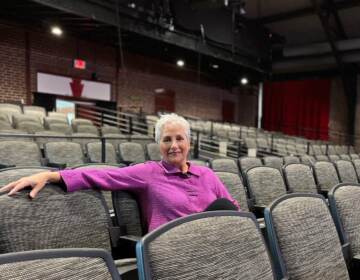‘Mud Row’ tells the story of black history in West Chester’s east end
Award-winning playwright Dominique Morisseau chooses West Chester’s east end for a play about gentrification.
Listen 2:59
Nikkole Salter and Renika Williams perform in Dominique Morisseau's "Mud Row." (Mark Garvin/People's Light)
The gymnasium of the Melton Center in West Chester is not hung with the kind of championship banners you might see above other basketball courts. Instead, there are portraits of notable African-Americans with ties to the town, like artist Horace Pippin and Dr. Lesley Pinckney Hill, the former president of Cheyney State Teachers College (now Cheyney University), who founded the Melton Center in 1918.
On a recent day, the floor of the gymnasium was set up with folding tables, populated by children from the neighborhood pouring over electronic tablets. It was a summer camp; they were playing literacy gaming apps.
“These students come from the low-income area of West Chester,” said the center’s executive director, Ken Winston. “This is the east end, where Mud Row is.”
Mud Row is the name of a neighborhood of West Chester, coined for being on the banks of Goose Creek. In the early 20th century, it was seen as undesirable, so it was given an undesirable name.
It’s also the name of a new play, premiering now at People’s Light and Theatre in Malvern. It’s based, in part, on the Melton Center and the rise, fall, and rise again of the neighborhood over the last century.
“There’s an income disparity between the east end and the rest of West Chester,” said Winston. That’s changing with gentrification. Winston points down Miner Street.
“Two blocks down, there are $300-$400,000 homes, right across from affordable houses,” he said. “It’s scary for some in the neighborhood, because they think they’re getting pushed out of West Chester.”

The Melton Center served as the gateway into West Chester for Dominique Morisseau, a Detroit-based writer commissioned six years ago by People’s Light and Theatre to write a new play. Through its New Plays Frontiers program, People’s Light had ushered a consort of six playwrights around Chester County, to pair them with a local community that resonated with them.
They first focused on organizations in Chester County with which the theater company already had long-standing relationships, “anchor institutions” like the Coatesville Youth Initiative, Historic Yellow Springs in Chester Springs, and Alianzas in Phoenixville.
Morisseau gravitated toward the Melton Center, which has served the predominantly African-American neighborhood for 101 years.
“It was the pride of the people that reminded me of my hometown,” she wrote in the playbill. “Because our communities across the nation, and the diaspora, are not so disconnected. We are all in need of the same things — respect for the land that we built, and honoring the people that sacrificed for us to have a sense of home.”
Morisseau wrote the book for the Broadway musical, “Ain’t Too Proud – the Life and Times of the Temptations,” for which she won a Tony Award. Last year, she was the recipient of a MacArthur Foundation “genius” grant.
For People’s Light, she engaged in a multi-year community engagement process to write “Mud Row.” That included meeting neighbors, learning local history, and sharing her work-in-progress with the people of West Chester’s east end.
Morisseau, like the other playwrights in the program, showed her work to the residents of West Chester as she was writing it, before any rewrites or edits.
“They are being vulnerable with work that is in process, and sharing it with community members who have a stake in what the writers are addressing,” said Marcie Bramucci, the director of community investment at People’s Light.
“You need to be mindful,” she said. “People are used to seeing performances. If you’re sharing something half-baked or in progress, it can be hard to know where it is heading or what it is capable of being. Managing expectations is really important with community partners.”
“Mud Row” premiered four weeks ago. The story toggles between two sisters living “way back when” (roughly the early 1960s, during the civil rights movement) and two sisters living “right now.” Both sets of sisters live in the same house — the latter are descendants of the earlier.
In the contemporary section, one sister is attempting to emerge out of a drug habit by squatting in the abandoned family home. Her estranged sister is attempting to sell the house to a developer.
For Winston, at the Melton Center, the play hits home.
“The one sister — the squatter — she used the house to give purpose to her life,” he said. “I used the community center to give purpose to my life.”
When Winston was hired as director in 2011, the finances of the Melton Center were on shaky ground. He credits the scrappy dedication of the community it serves for keeping the center’s doors open.
At the time, Winston himself was not doing well. He had been fired from his coaching position at Phoenixville High School. His starting salary as director of the Melton Center was zero.
He signed on as a volunteer director because he had faith that the center would once again rise.
“Will you roll with me when I’m doing bad?” he asked. “As an institution, we’re weren’t doing good. I got a lot of respect for people who rolled up their sleeves, keep the doors open. I think Dominique brought some of that out in the play.”
Winston is now paid, the center’s sole full-time employee, running an army of volunteer and part-time staff.
The center has big plans on the horizon. It recently was the recipient of $2.1 million in state grants toward the development of mixed-income housing nearby. It will be Melton’s first neighborhood development project.
The production of “Mud Row” at People’s Light and Theater has just been extended through Aug. 4.
WHYY is your source for fact-based, in-depth journalism and information. As a nonprofit organization, we rely on financial support from readers like you. Please give today.





